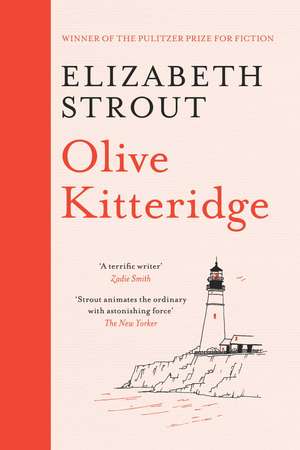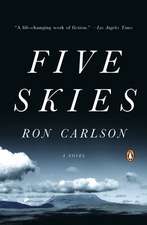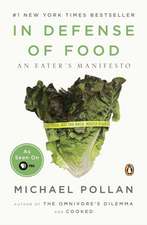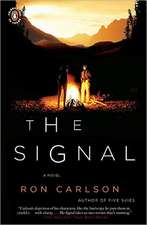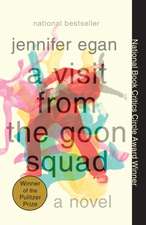Olive Kitteridge: A Novel in Stories
Autor Elizabeth Strouten Limba Engleză Paperback – 25 iul 2024
Olive Kitteridge: indomitable, compassionate, and often unpredictable. A retired schoolteacher in a small coastal town in Maine, as Olive grows older, she struggles to make sense of the changes in her life. She is a woman who sees into the hearts of those around her, their triumphs and tragedies.
A penetrating, vibrant exploration of the human soul, the story of Olive Kitteridge will make you laugh, nod in recognition, wince in pain, and shed a tear or two.
'As perfect a novel as you will ever read'
Evening Standard
'A superbly gifted storyteller and a craftswoman in a league of her own'
Hilary Mantel
| Toate formatele și edițiile | Preț | Express |
|---|---|---|
| Paperback (2) | 56.43 lei 25-37 zile | +24.33 lei 5-11 zile |
| SCRIBNER UK – 25 iul 2024 | 56.43 lei 25-37 zile | +24.33 lei 5-11 zile |
| Random House Trade – 31 aug 2008 | 69.44 lei 3-5 săpt. | +10.24 lei 5-11 zile |
| Hardback (1) | 155.49 lei 3-5 săpt. | |
| Random House (NY) – 29 feb 2008 | 155.49 lei 3-5 săpt. |
Preț: 56.43 lei
Preț vechi: 70.07 lei
-19% Nou
Puncte Express: 85
Preț estimativ în valută:
10.80€ • 11.23$ • 8.92£
10.80€ • 11.23$ • 8.92£
Carte disponibilă
Livrare economică 28 martie-09 aprilie
Livrare express 08-14 martie pentru 34.32 lei
Preluare comenzi: 021 569.72.76
Specificații
ISBN-13: 9781398532786
ISBN-10: 1398532789
Pagini: 352
Dimensiuni: 130 x 198 x 21 mm
Greutate: 0.26 kg
Ediția:Reissue
Editura: SCRIBNER UK
Colecția Scribner UK
ISBN-10: 1398532789
Pagini: 352
Dimensiuni: 130 x 198 x 21 mm
Greutate: 0.26 kg
Ediția:Reissue
Editura: SCRIBNER UK
Colecția Scribner UK
Recenzii
‘As perfect a novel as you will ever read . . . So astonishingly good that I shall be reading it once a year for the foreseeable future and very probably for the rest of my life’
‘Strout animates the ordinary with astonishing force’
‘Masterfully wrought’
‘Strout has a wonderful ability to turn a phrase…[these] pages hold what life puts in: experience, joy, grief, and the sometimes-painful journey to love’
'I am deeply impressed. Writing of this quality comes from a commitment to listening, from a perfect attunement to the human condition, from an attention to reality so exact that it goes beyond a skill and becomes a virtue. I have never read her before and I knew within a few sentences that here was an artist to value and respect'
'Strout's best novel yet'
'An exquisite novel... in its careful words and vibrating silences, My Name Is Lucy Barton offers us a rare wealth of emotion, from darkest suffering to - 'I was so happy. Oh, I was happy' - simple joy'
'So good I got goosebumps... a masterly novel of family ties by one of America's finest writers'
'My Name is Lucy Barton confirms Strout as a powerful storyteller immersed in the nuances of human relationships... Deeply affecting novel...visceral and heartbreaking...If she hadn't already won the Pulitzer for Olive Kitteridge this new novel would surely be a contender'
'Hypnotic...yielding a glut of profoundly human truths to do with flight, memory and longing'
'This is a book you'll want to return to again and again and again'
'Slim and spectacular...My Name Is Lucy Barton is smart and cagey in every way. It is both a book of withholdings and a book of great openness and wisdom. It starts with the clean, solid structure and narrative distance of a fairy tale yet becomes more intimate and improvisational, coming close at times to the rawness of autofiction by writers such as Karl Ove Knausgaard and Rachel Cusk. Strout is playing with form here, with ways to get at a story, yet nothing is tentative or haphazard. She is in supreme and magnificent command of this novel at all times....'
'My Name Is Lucy Barton is a short novel about love, particularly the complicated love between mothers and daughters... It evokes these connections in a style so spare, so pure and so profound the book almost seems to be a kind of scripture or sutra, if a very down-to-earth and unpretentious one'
'Her concise writing is a masterclass in deceptive simplicity...Strout writes with an exacting rhythm, with each word and clause perfectly placed and weighted and each sentence as clear and bracing as grapefruit. It's a small masterpiece'
'This short, simple, quiet novel wriggles its way right into your heart and stays there'
'A beautifully taut novel'
'Agleam with extraordinary psychological insights...delicate, tender but ruthless reveries'
'An eerie, compelling novel, its deceptively simple language is a 'slight rush of words' which hold much more than they seem capable of containing...This novel is about the need to create a story we can live with when the real story cannot be told...'
'Strout uses a different voice herself in this novel: a spare simple one, elegiac in tone that sometimes brings to mind Joan Didion's'
'An exquisitely written story...a brutally honest, absorbing and emotive read'
'This is a glorious novel, deft, tender and true. Read it'
'Honest, intimate and ultimately unforgettable'
'Strout's prose propels the story forward with moments of startlingly poetic clarity.'
'One of those rare, invigorating books that take an apparently familiar world and peer into it with ruthless intimacy, revealing a strange and startling place.'
'A novel of shining integrity and humour'
‘Strout animates the ordinary with astonishing force’
‘Masterfully wrought’
‘Strout has a wonderful ability to turn a phrase…[these] pages hold what life puts in: experience, joy, grief, and the sometimes-painful journey to love’
'I am deeply impressed. Writing of this quality comes from a commitment to listening, from a perfect attunement to the human condition, from an attention to reality so exact that it goes beyond a skill and becomes a virtue. I have never read her before and I knew within a few sentences that here was an artist to value and respect'
'Strout's best novel yet'
'An exquisite novel... in its careful words and vibrating silences, My Name Is Lucy Barton offers us a rare wealth of emotion, from darkest suffering to - 'I was so happy. Oh, I was happy' - simple joy'
'So good I got goosebumps... a masterly novel of family ties by one of America's finest writers'
'My Name is Lucy Barton confirms Strout as a powerful storyteller immersed in the nuances of human relationships... Deeply affecting novel...visceral and heartbreaking...If she hadn't already won the Pulitzer for Olive Kitteridge this new novel would surely be a contender'
'Hypnotic...yielding a glut of profoundly human truths to do with flight, memory and longing'
'This is a book you'll want to return to again and again and again'
'Slim and spectacular...My Name Is Lucy Barton is smart and cagey in every way. It is both a book of withholdings and a book of great openness and wisdom. It starts with the clean, solid structure and narrative distance of a fairy tale yet becomes more intimate and improvisational, coming close at times to the rawness of autofiction by writers such as Karl Ove Knausgaard and Rachel Cusk. Strout is playing with form here, with ways to get at a story, yet nothing is tentative or haphazard. She is in supreme and magnificent command of this novel at all times....'
'My Name Is Lucy Barton is a short novel about love, particularly the complicated love between mothers and daughters... It evokes these connections in a style so spare, so pure and so profound the book almost seems to be a kind of scripture or sutra, if a very down-to-earth and unpretentious one'
'Her concise writing is a masterclass in deceptive simplicity...Strout writes with an exacting rhythm, with each word and clause perfectly placed and weighted and each sentence as clear and bracing as grapefruit. It's a small masterpiece'
'This short, simple, quiet novel wriggles its way right into your heart and stays there'
'A beautifully taut novel'
'Agleam with extraordinary psychological insights...delicate, tender but ruthless reveries'
'An eerie, compelling novel, its deceptively simple language is a 'slight rush of words' which hold much more than they seem capable of containing...This novel is about the need to create a story we can live with when the real story cannot be told...'
'Strout uses a different voice herself in this novel: a spare simple one, elegiac in tone that sometimes brings to mind Joan Didion's'
'An exquisitely written story...a brutally honest, absorbing and emotive read'
'This is a glorious novel, deft, tender and true. Read it'
'Honest, intimate and ultimately unforgettable'
'Strout's prose propels the story forward with moments of startlingly poetic clarity.'
'One of those rare, invigorating books that take an apparently familiar world and peer into it with ruthless intimacy, revealing a strange and startling place.'
'A novel of shining integrity and humour'
Descriere
Acclaimed author Elizabeth Strout gives us thirteen rich, luminous narratives centred on a singular and formidable heroine, Olive Kitteridge.
Notă biografică
Elizabeth Strout is the author of Abide with Me, a national bestseller and Book Sense pick, and Amy and Isabelle, which won the Los Angeles Times Art Seidenbaum Award for First Fiction and the Chicago Tribune Heartland Prize. She has also been a finalist for the PEN/Faulkner Award and the Orange Prize in England. Her short stories have been published in a number of magazines, including The New Yorker and O: The Oprah Magazine. She is on the faculty of the MFA program at Queens University in Charlotte, North Carolina, and lives in New York City.
From the Hardcover edition.
From the Hardcover edition.
Extras
Chapter 1
Pharmacy
For many years Henry Kitteridge was a pharmacist in the next town over, driving every morning on snowy roads, or rainy roads, or summertime roads, when the wild raspberries shot their new growth in brambles along the last section of town before he turned off to where the wider road led to the pharmacy. Retired now, he still wakes early and remembers how mornings used to be his favorite, as though the world were his secret, tires rumbling softly beneath him and the light emerging through the early fog, the brief sight of the bay off to his right, then the pines, tall and slender, and almost always he rode with the window partly open because he loved the smell of the pines and the heavy salt air, and in the winter he loved the smell of the cold. The pharmacy was a small two-story building attached to another building that housed separately a hardware store and a small grocery. Each morning Henry parked in the back by the large metal bins, and then entered the pharmacy’s back door, and went about switching on the lights, turning up the thermostat, or, if it was summer, getting the fans going. He would open the safe, put money in the register, unlock the front door, wash his hands, put on his white lab coat. The ritual was pleasing, as though the old store—with its shelves of toothpaste, vitamins, cosmetics, hair adornments, even sewing needles and greeting cards, as well as red rubber hot water bottles, enema pumps—was a person altogether steady and steadfast. And any unpleasantness that may have occurred back in his home, any uneasiness at the way his wife often left their bed to wander through their home in the night’s dark hours—all this receded like a shoreline as he walked through the safety of his pharmacy. Standing in the back, with the drawers and rows of pills, Henry was cheerful when the phone began to ring, cheerful when Mrs. Merriman came for her blood pressure medicine, or old Cliff Mott arrived for his digitalis, cheerful when he prepared the Valium for Rachel Jones, whose husband ran off the night their baby was born. It was Henry’s nature to listen, and many times during the week he would say, “Gosh, I’m awful sorry to hear that,” or “Say, isn’t that something?” Inwardly, he suffered the quiet trepidations of a man who had witnessed twice in childhood the nervous breakdowns of a mother who had otherwise cared for him with stridency. And so if, as rarely happened, a customer was distressed over a price, or irritated by the quality of an Ace bandage or ice pack, Henry did what he could to rectify things quickly. For many years Mrs. Granger worked for him; her husband was a lobster fisherman, and she seemed to carry with her the cold breeze of the open water, not so eager to please a wary customer. He had to listen with half an ear as he filled prescriptions, to make sure she was not at the cash register dismissing a complaint. More than once he was reminded of that same sensation in watching to see that his wife, Olive, did not bear down too hard on Christopher over a homework assignment or a chore left undone; that sense of his attention hovering—the need to keep everyone content. When he heard a briskness in Mrs. Granger’s voice, he would step down from his back post, moving toward the center of the store to talk with the customer himself. Otherwise, Mrs. Granger did her job well. He appreciated that she was not chatty, kept perfect inventory, and almost never called in sick. That she died in her sleep one night astonished him, and left him with some feeling of responsibility, as though he had missed, working alongside her for years, whatever symptom might have shown itself that he, handling his pills and syrups and syringes, could have fixed. “Mousy,” his wife said, when he hired the new girl. “Looks just like a mouse.” Denise Thibodeau had round cheeks, and small eyes that peeped through her brown-framed glasses. “But a nice mouse,” Henry said. “A cute one.” “No one’s cute who can’t stand up straight,” Olive said. It was true that Denise’s narrow shoulders sloped forward, as though apologizing for something. She was twenty-two, just out of the state university of Vermont. Her husband was also named Henry, and Henry Kitteridge, meeting Henry Thibodeau for the first time, was taken with what he saw as an unself-conscious excellence. The young man was vigorous and sturdy-featured with a light in his eye that seemed to lend a flickering resplendence to his decent, ordinary face. He was a plumber, working in a business owned by his uncle. He and Denise had been married one year. “Not keen on it,” Olive said, when he suggested they have the young couple to dinner. Henry let it drop. This was a time when his son—not yet showing the physical signs of adolescence—had become suddenly and strenuously sullen, his mood like a poison shot through the air, and Olive seemed as changed and changeable as Christopher, the two having fast and furious fights that became just as suddenly some blanket of silent intimacy where Henry, clueless, stupefied, would find himself to be the odd man out. But standing in the back parking lot at the end of a late summer day, while he spoke with Denise and Henry Thibodeau, and the sun tucked itself behind the spruce trees, Henry Kitteridge felt such a longing to be in the presence of this young couple, their faces turned to him with a diffident but eager interest as he recalled his own days at the university many years ago, that he said, “Now, say. Olive and I would like you to come for supper soon.” He drove home, past the tall pines, past the glimpse of the bay, and thought of the Thibodeaus driving the other way, to their trailer on the outskirts of town. He pictured the trailer, cozy and picked up—for Denise was neat in her habits—and imagined them sharing the news of their day. Denise might say, “He’s an easy boss.” And Henry might say, “Oh, I like the guy a lot.” He pulled into his driveway, which was not a driveway so much as a patch of lawn on top of the hill, and saw Olive in the garden. “Hello, Olive,” he said, walking to her. He wanted to put his arms around her, but she had a darkness that seemed to stand beside her like an acquaintance that would not go away. He told her the Thibodeaus were coming for supper. “It’s only right,” he said. Olive wiped sweat from her upper lip, turned to rip up a clump of onion grass. “Then that’s that, Mr. President,” she said. “Give your order to the cook.” On Friday night the couple followed him home, and the young Henry shook Olive’s hand. “Nice place here,” he said. “With that view of the water. Mr. Kitteridge says you two built this yourselves.” “Indeed, we did.” Christopher sat sideways at the table, slumped in adolescent gracelessness, and did not respond when Henry Thibodeau asked him if he played any sports at school. Henry Kitteridge felt an unexpected fury sprout inside him; he wanted to shout at the boy, whose poor manners, he felt, revealed something unpleasant not expected to be found in the Kitteridge home. “When you work in a pharmacy,” Olive told Denise, setting before her a plate of baked beans, “you learn the secrets of everyone in town.” Olive sat down across from her, pushed forward a bottle of ketchup. “Have to know to keep your mouth shut. But seems like you know how to do that.” “Denise understands,” Henry Kitteridge said. Denise’s husband said, “Oh, sure. You couldn’t find someone more trustworthy than Denise.” “I believe you,” Henry said, passing the man a basket of rolls. “And please. Call me Henry. One of my favorite names,” he added. Denise laughed quietly; she liked him, he could see this. Christopher slumped farther into his seat. Henry Thibodeau’s parents lived on a farm inland, and so the two Henrys discussed crops, and pole beans, and the corn not being as sweet this summer from the lack of rain, and how to get a good asparagus bed. “Oh, for God’s sake,” said Olive, when, in passing the ketchup to the young man, Henry Kitteridge knocked it over, and ketchup lurched out like thickened blood across the oak table. Trying to pick up the bottle, he caused it to roll unsteadily, and ketchup ended up on his fingertips, then on his white shirt. “Leave it,” Olive commanded, standing up. “Just leave it alone, Henry. For God’s sake.” And Henry Thibodeau, perhaps at the sound of his own name being spoken sharply, sat back, looking stricken. “Gosh, what a mess I’ve made,” Henry Kitteridge said. For dessert they were each handed a blue bowl with a scoop of vanilla ice cream sliding in its center. “Vanilla’s my favorite,” Denise said. “Is it,” said Olive. “Mine, too,” Henry Kitteridge said. As autumn came, the mornings darker, and the pharmacy getting only a short sliver of the direct sun before it passed over the building and left the store lit by its own overhead lights, Henry stood in the back filling the small plastic bottles, answering the telephone, while Denise stayed up front near the cash register. At lunchtime, she unwrapped a sandwich she brought from home, and ate it in the back where the storage was, and then he would eat his lunch, and sometimes when there was no one in the store, they would linger with a cup of coffee bought from the grocer next door. Denise seemed a naturally quiet girl, but she was given to spurts of sudden talkativeness. “My mother’s had MS for years, you know, so starting way back we all learned to help out. All three of my brothers are different. Don’t you think it’s funny when it happens that way?” The oldest brother, Denise said, straightening a bottle of shampoo, had been her father’s favorite until he’d married a girl her father didn’t like. Her own in-laws were wonderful, she said. She’d had a boyfriend before Henry, a Protestant, and his parents had not been so kind to her. “It wouldn’t have worked out,” she said, tucking a strand of hair behind her ear. “Well, Henry’s a terrific young man,” Henry answered. She nodded, smiling through her glasses like a thirteen-year-old girl. Again, he pictured her trailer, the two of them like overgrown puppies tumbling together; he could not have said why this gave him the particular kind of happiness it did, like liquid gold being poured through him. She was as efficient as Mrs. Granger had been, but more relaxed. “Right beneath the vitamins in the second aisle,” she would tell a customer. “Here, I’ll show you.” Once, she told Henry she sometimes let a person wander around the store before asking if she could help them. “That way, see, they might find something they didn’t know they needed. And your sales will go up.” A block of winter sun was splayed across the glass of the cosmetics shelf; a strip of wooden floor shone like honey. He raised his eyebrows appreciatively. “Lucky for me, Denise, when you came through that door.” She pushed up her glasses with the back of her hand, then ran the duster over the ointment jars. Jerry McCarthy, the boy who delivered the pharmaceuticals once a week from Portland—or more often if needed—would sometimes have his lunch in the back room. He was eighteen, right out of high school; a big, fat kid with a smooth face, who perspired so much that splotches of his shirt would be wet, at times even down over his breasts, so the poor fellow looked to be lactating. Seated on a crate, his big knees practically to his ears, he’d eat a sandwich that had spilling from it mayonnaisey clumps of egg salad or tuna fish, landing on his shirt. More than once Henry saw Denise hand him a paper towel. “That happens to me,” Henry heard her say one day. “Whenever I eat a sandwich that isn’t just cold cuts, I end up a mess.” It couldn’t have been true. The girl was neat as a pin, if plain as a plate. “Good afternoon,” she’d say when the telephone rang. “This is the Village Pharmacy. How can I help you today?” Like a girl playing grown-up. And then: On a Monday morning when the air in the pharmacy held a sharp chill, he went about opening up the store, saying, “How was your weekend, Denise?” Olive had refused to go to church the day before, and Henry, uncharacteristically, had spoken to her sharply. “Is it too much to ask,” he had found himself saying, as he stood in the kitchen in his undershorts, ironing his trousers. “A man’s wife accompanying him to church?” Going without her seemed a public exposure of familial failure. “Yes, it most certainly is too goddamn much to ask!” Olive had almost spit, her fury’s door flung open. “You have no idea how tired I am, teaching all day, going to foolish meetings where the goddamn principal is a moron! Shopping. Cooking. Ironing. Laundry. Doing Christopher’s homework with him! And you—” She had grabbed on to the back of a dining room chair, and her dark hair, still uncombed from its night’s disarrangement, had fallen across her eyes. “You, Mr. Head Deacon Claptrap Nice Guy, expect me to give up my Sunday mornings and go sit among a bunch of snot-wots!” Very suddenly she had sat down in the chair. “Well, I’m sick and tired of it,” she’d said, calmly. “Sick to death.” A darkness had rumbled through him; his soul was suffocating in tar. The next morning, Olive spoke to him conversationally. “Jim’s car smelled like upchuck last week. Hope he’s cleaned it out.” Jim O’Casey taught with Olive, and for years took both Christopher and Olive to school. “Hope so,” said Henry, and in that way their fight was done. “Oh, I had a wonderful weekend,” said Denise, her small eyes behind her glasses looking at him with an eagerness that was so childlike it could have cracked his heart in two. “We went to Henry’s folks and dug potatoes at night. Henry put the headlights on from the car and we dug potatoes. Finding the potatoes in that cold soil—like an Easter egg hunt!” He stopped unpacking a shipment of penicillin, and stepped down to talk to her. There were no customers yet, and below the front window the radiator hissed. He said, “Isn’t that lovely, Denise.” She nodded, touching the top of the vitamin shelf beside her. A small motion of fear seemed to pass over her face. “I got cold and went and sat in the car and watched Henry digging potatoes, and I thought: It’s too good to be true.”
From the Hardcover edition.
Pharmacy
For many years Henry Kitteridge was a pharmacist in the next town over, driving every morning on snowy roads, or rainy roads, or summertime roads, when the wild raspberries shot their new growth in brambles along the last section of town before he turned off to where the wider road led to the pharmacy. Retired now, he still wakes early and remembers how mornings used to be his favorite, as though the world were his secret, tires rumbling softly beneath him and the light emerging through the early fog, the brief sight of the bay off to his right, then the pines, tall and slender, and almost always he rode with the window partly open because he loved the smell of the pines and the heavy salt air, and in the winter he loved the smell of the cold. The pharmacy was a small two-story building attached to another building that housed separately a hardware store and a small grocery. Each morning Henry parked in the back by the large metal bins, and then entered the pharmacy’s back door, and went about switching on the lights, turning up the thermostat, or, if it was summer, getting the fans going. He would open the safe, put money in the register, unlock the front door, wash his hands, put on his white lab coat. The ritual was pleasing, as though the old store—with its shelves of toothpaste, vitamins, cosmetics, hair adornments, even sewing needles and greeting cards, as well as red rubber hot water bottles, enema pumps—was a person altogether steady and steadfast. And any unpleasantness that may have occurred back in his home, any uneasiness at the way his wife often left their bed to wander through their home in the night’s dark hours—all this receded like a shoreline as he walked through the safety of his pharmacy. Standing in the back, with the drawers and rows of pills, Henry was cheerful when the phone began to ring, cheerful when Mrs. Merriman came for her blood pressure medicine, or old Cliff Mott arrived for his digitalis, cheerful when he prepared the Valium for Rachel Jones, whose husband ran off the night their baby was born. It was Henry’s nature to listen, and many times during the week he would say, “Gosh, I’m awful sorry to hear that,” or “Say, isn’t that something?” Inwardly, he suffered the quiet trepidations of a man who had witnessed twice in childhood the nervous breakdowns of a mother who had otherwise cared for him with stridency. And so if, as rarely happened, a customer was distressed over a price, or irritated by the quality of an Ace bandage or ice pack, Henry did what he could to rectify things quickly. For many years Mrs. Granger worked for him; her husband was a lobster fisherman, and she seemed to carry with her the cold breeze of the open water, not so eager to please a wary customer. He had to listen with half an ear as he filled prescriptions, to make sure she was not at the cash register dismissing a complaint. More than once he was reminded of that same sensation in watching to see that his wife, Olive, did not bear down too hard on Christopher over a homework assignment or a chore left undone; that sense of his attention hovering—the need to keep everyone content. When he heard a briskness in Mrs. Granger’s voice, he would step down from his back post, moving toward the center of the store to talk with the customer himself. Otherwise, Mrs. Granger did her job well. He appreciated that she was not chatty, kept perfect inventory, and almost never called in sick. That she died in her sleep one night astonished him, and left him with some feeling of responsibility, as though he had missed, working alongside her for years, whatever symptom might have shown itself that he, handling his pills and syrups and syringes, could have fixed. “Mousy,” his wife said, when he hired the new girl. “Looks just like a mouse.” Denise Thibodeau had round cheeks, and small eyes that peeped through her brown-framed glasses. “But a nice mouse,” Henry said. “A cute one.” “No one’s cute who can’t stand up straight,” Olive said. It was true that Denise’s narrow shoulders sloped forward, as though apologizing for something. She was twenty-two, just out of the state university of Vermont. Her husband was also named Henry, and Henry Kitteridge, meeting Henry Thibodeau for the first time, was taken with what he saw as an unself-conscious excellence. The young man was vigorous and sturdy-featured with a light in his eye that seemed to lend a flickering resplendence to his decent, ordinary face. He was a plumber, working in a business owned by his uncle. He and Denise had been married one year. “Not keen on it,” Olive said, when he suggested they have the young couple to dinner. Henry let it drop. This was a time when his son—not yet showing the physical signs of adolescence—had become suddenly and strenuously sullen, his mood like a poison shot through the air, and Olive seemed as changed and changeable as Christopher, the two having fast and furious fights that became just as suddenly some blanket of silent intimacy where Henry, clueless, stupefied, would find himself to be the odd man out. But standing in the back parking lot at the end of a late summer day, while he spoke with Denise and Henry Thibodeau, and the sun tucked itself behind the spruce trees, Henry Kitteridge felt such a longing to be in the presence of this young couple, their faces turned to him with a diffident but eager interest as he recalled his own days at the university many years ago, that he said, “Now, say. Olive and I would like you to come for supper soon.” He drove home, past the tall pines, past the glimpse of the bay, and thought of the Thibodeaus driving the other way, to their trailer on the outskirts of town. He pictured the trailer, cozy and picked up—for Denise was neat in her habits—and imagined them sharing the news of their day. Denise might say, “He’s an easy boss.” And Henry might say, “Oh, I like the guy a lot.” He pulled into his driveway, which was not a driveway so much as a patch of lawn on top of the hill, and saw Olive in the garden. “Hello, Olive,” he said, walking to her. He wanted to put his arms around her, but she had a darkness that seemed to stand beside her like an acquaintance that would not go away. He told her the Thibodeaus were coming for supper. “It’s only right,” he said. Olive wiped sweat from her upper lip, turned to rip up a clump of onion grass. “Then that’s that, Mr. President,” she said. “Give your order to the cook.” On Friday night the couple followed him home, and the young Henry shook Olive’s hand. “Nice place here,” he said. “With that view of the water. Mr. Kitteridge says you two built this yourselves.” “Indeed, we did.” Christopher sat sideways at the table, slumped in adolescent gracelessness, and did not respond when Henry Thibodeau asked him if he played any sports at school. Henry Kitteridge felt an unexpected fury sprout inside him; he wanted to shout at the boy, whose poor manners, he felt, revealed something unpleasant not expected to be found in the Kitteridge home. “When you work in a pharmacy,” Olive told Denise, setting before her a plate of baked beans, “you learn the secrets of everyone in town.” Olive sat down across from her, pushed forward a bottle of ketchup. “Have to know to keep your mouth shut. But seems like you know how to do that.” “Denise understands,” Henry Kitteridge said. Denise’s husband said, “Oh, sure. You couldn’t find someone more trustworthy than Denise.” “I believe you,” Henry said, passing the man a basket of rolls. “And please. Call me Henry. One of my favorite names,” he added. Denise laughed quietly; she liked him, he could see this. Christopher slumped farther into his seat. Henry Thibodeau’s parents lived on a farm inland, and so the two Henrys discussed crops, and pole beans, and the corn not being as sweet this summer from the lack of rain, and how to get a good asparagus bed. “Oh, for God’s sake,” said Olive, when, in passing the ketchup to the young man, Henry Kitteridge knocked it over, and ketchup lurched out like thickened blood across the oak table. Trying to pick up the bottle, he caused it to roll unsteadily, and ketchup ended up on his fingertips, then on his white shirt. “Leave it,” Olive commanded, standing up. “Just leave it alone, Henry. For God’s sake.” And Henry Thibodeau, perhaps at the sound of his own name being spoken sharply, sat back, looking stricken. “Gosh, what a mess I’ve made,” Henry Kitteridge said. For dessert they were each handed a blue bowl with a scoop of vanilla ice cream sliding in its center. “Vanilla’s my favorite,” Denise said. “Is it,” said Olive. “Mine, too,” Henry Kitteridge said. As autumn came, the mornings darker, and the pharmacy getting only a short sliver of the direct sun before it passed over the building and left the store lit by its own overhead lights, Henry stood in the back filling the small plastic bottles, answering the telephone, while Denise stayed up front near the cash register. At lunchtime, she unwrapped a sandwich she brought from home, and ate it in the back where the storage was, and then he would eat his lunch, and sometimes when there was no one in the store, they would linger with a cup of coffee bought from the grocer next door. Denise seemed a naturally quiet girl, but she was given to spurts of sudden talkativeness. “My mother’s had MS for years, you know, so starting way back we all learned to help out. All three of my brothers are different. Don’t you think it’s funny when it happens that way?” The oldest brother, Denise said, straightening a bottle of shampoo, had been her father’s favorite until he’d married a girl her father didn’t like. Her own in-laws were wonderful, she said. She’d had a boyfriend before Henry, a Protestant, and his parents had not been so kind to her. “It wouldn’t have worked out,” she said, tucking a strand of hair behind her ear. “Well, Henry’s a terrific young man,” Henry answered. She nodded, smiling through her glasses like a thirteen-year-old girl. Again, he pictured her trailer, the two of them like overgrown puppies tumbling together; he could not have said why this gave him the particular kind of happiness it did, like liquid gold being poured through him. She was as efficient as Mrs. Granger had been, but more relaxed. “Right beneath the vitamins in the second aisle,” she would tell a customer. “Here, I’ll show you.” Once, she told Henry she sometimes let a person wander around the store before asking if she could help them. “That way, see, they might find something they didn’t know they needed. And your sales will go up.” A block of winter sun was splayed across the glass of the cosmetics shelf; a strip of wooden floor shone like honey. He raised his eyebrows appreciatively. “Lucky for me, Denise, when you came through that door.” She pushed up her glasses with the back of her hand, then ran the duster over the ointment jars. Jerry McCarthy, the boy who delivered the pharmaceuticals once a week from Portland—or more often if needed—would sometimes have his lunch in the back room. He was eighteen, right out of high school; a big, fat kid with a smooth face, who perspired so much that splotches of his shirt would be wet, at times even down over his breasts, so the poor fellow looked to be lactating. Seated on a crate, his big knees practically to his ears, he’d eat a sandwich that had spilling from it mayonnaisey clumps of egg salad or tuna fish, landing on his shirt. More than once Henry saw Denise hand him a paper towel. “That happens to me,” Henry heard her say one day. “Whenever I eat a sandwich that isn’t just cold cuts, I end up a mess.” It couldn’t have been true. The girl was neat as a pin, if plain as a plate. “Good afternoon,” she’d say when the telephone rang. “This is the Village Pharmacy. How can I help you today?” Like a girl playing grown-up. And then: On a Monday morning when the air in the pharmacy held a sharp chill, he went about opening up the store, saying, “How was your weekend, Denise?” Olive had refused to go to church the day before, and Henry, uncharacteristically, had spoken to her sharply. “Is it too much to ask,” he had found himself saying, as he stood in the kitchen in his undershorts, ironing his trousers. “A man’s wife accompanying him to church?” Going without her seemed a public exposure of familial failure. “Yes, it most certainly is too goddamn much to ask!” Olive had almost spit, her fury’s door flung open. “You have no idea how tired I am, teaching all day, going to foolish meetings where the goddamn principal is a moron! Shopping. Cooking. Ironing. Laundry. Doing Christopher’s homework with him! And you—” She had grabbed on to the back of a dining room chair, and her dark hair, still uncombed from its night’s disarrangement, had fallen across her eyes. “You, Mr. Head Deacon Claptrap Nice Guy, expect me to give up my Sunday mornings and go sit among a bunch of snot-wots!” Very suddenly she had sat down in the chair. “Well, I’m sick and tired of it,” she’d said, calmly. “Sick to death.” A darkness had rumbled through him; his soul was suffocating in tar. The next morning, Olive spoke to him conversationally. “Jim’s car smelled like upchuck last week. Hope he’s cleaned it out.” Jim O’Casey taught with Olive, and for years took both Christopher and Olive to school. “Hope so,” said Henry, and in that way their fight was done. “Oh, I had a wonderful weekend,” said Denise, her small eyes behind her glasses looking at him with an eagerness that was so childlike it could have cracked his heart in two. “We went to Henry’s folks and dug potatoes at night. Henry put the headlights on from the car and we dug potatoes. Finding the potatoes in that cold soil—like an Easter egg hunt!” He stopped unpacking a shipment of penicillin, and stepped down to talk to her. There were no customers yet, and below the front window the radiator hissed. He said, “Isn’t that lovely, Denise.” She nodded, touching the top of the vitamin shelf beside her. A small motion of fear seemed to pass over her face. “I got cold and went and sat in the car and watched Henry digging potatoes, and I thought: It’s too good to be true.”
From the Hardcover edition.
